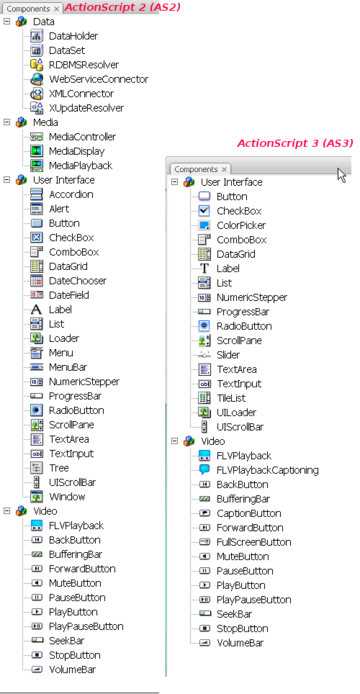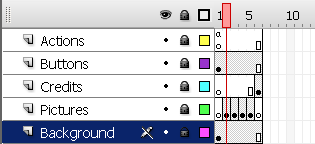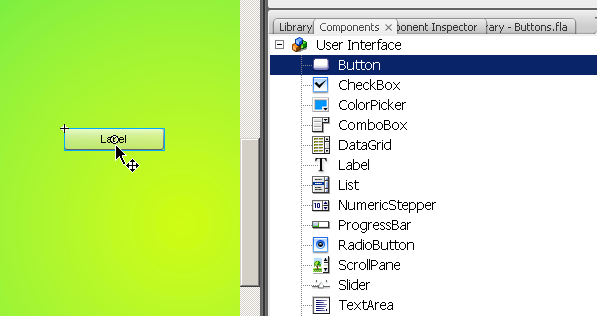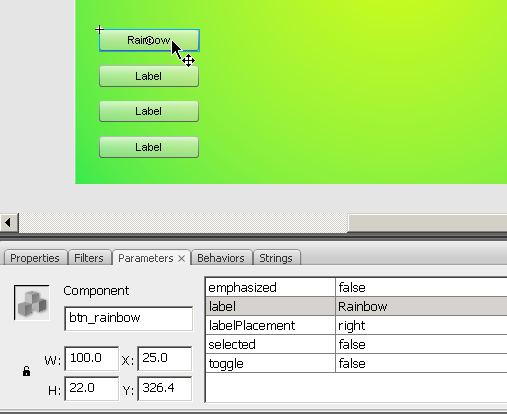Flash components overview: Difference between revisions
m (using an external editor) |
m (using an external editor) |
||
| Line 1: | Line 1: | ||
{{ | {{Incomplete}} | ||
== Overview == | == Overview == | ||
[[image:flash-cs3-component libraries.png|thumb|360px|right|Flash CS3 component library]] | [[image:flash-cs3-component libraries.png|thumb|360px|right|Flash CS3 component library]] | ||
| Line 206: | Line 206: | ||
; Results | ; Results | ||
* [http://tecfa.unige.ch/guides/flash/ex/components-intro/flash-cs3-simple-slide-show-menu. | * [http://tecfa.unige.ch/guides/flash/ex/components-intro/flash-cs3-simple-slide-show-menu.html flash-cs3-simple-slide-show-menu.html] | ||
* Grab the flash-cs3-simple-slide-show-menu.* files from | * Grab the flash-cs3-simple-slide-show-menu.* files from | ||
: http://tecfa.unige.ch/guides/flash/ex/components-intro/ | : http://tecfa.unige.ch/guides/flash/ex/components-intro/ | ||
| Line 217: | Line 217: | ||
So here is what you need to change: | So here is what you need to change: | ||
; Event listener registration | ; (1) Event listener registration | ||
So the principle is: For each button you got to register an event listener function. Change: | So the principle is: For each button you got to register an event listener function. Change: | ||
* The number of addEventListener definitions (here we got five) | * The number of addEventListener definitions (here we got five) | ||
| Line 223: | Line 223: | ||
myButton.addEventListener(MouseEvent.CLICK, Handler_A); | myButton.addEventListener(MouseEvent.CLICK, Handler_A); | ||
; Define event listener functions | ; (2) Define event listener functions | ||
* Copy/Paste/Change definitions of functions | * Copy/Paste/Change definitions of functions | ||
* So change the name of the function, e.g. ''clickHandler_1'' into ''Handler_A'' and the frame it has to jump to. | * So change the name of the function, e.g. ''clickHandler_1'' into ''Handler_A'' and the frame it has to jump to. | ||
| Line 283: | Line 283: | ||
; Results | ; Results | ||
* [http://tecfa.unige.ch/guides/flash/ex/components-intro/flash-cs3-simple-slide-show-menu-fewcode. | * [http://tecfa.unige.ch/guides/flash/ex/components-intro/flash-cs3-simple-slide-show-menu-fewcode.html flash-cs3-simple-slide-show-menu-fewcode.html] | ||
* Grab the flash-cs3-flash-cs3-simple-slide-show-menu-fewcode.* files from | * Grab the flash-cs3-flash-cs3-simple-slide-show-menu-fewcode.* files from | ||
: http://tecfa.unige.ch/guides/flash/ex/components-intro/ | : http://tecfa.unige.ch/guides/flash/ex/components-intro/ | ||
| Line 290: | Line 290: | ||
The AS3 script above will not work in Flash 8. You have to work with the AS2 component library. | The AS3 script above will not work in Flash 8. You have to work with the AS2 component library. | ||
This also means that you'd have to delete the buttons in the above example if you want to convert to AS2. If you make a fresh start, no problem, the component button looks and behaves almost the same as its AS3 version | This also means that you'd have to delete the buttons in the above example if you want to convert to AS2. If you make a fresh start, no problem, the component button looks and behaves almost the same as its AS3 version as you can see in the screen capture below: | ||
ActionScript 2 code is much simpler. The (good) reason why the much more powerful ActionScript 3 is more complicated is that ActionScript 3 allows to program Flash *.swf without even opening the Flash authoring environment. It's a language also made for programmers who do not necessarily like this frame-based tool. | ; The AS2 button component | ||
* Just change the label and if necessary the width parameter (E.g. we set '''W:''' to the left to 400 since the btn_edutech_wiki needs to be large). | |||
[[image:flash-cs3-button-component-parameters.png|frame|none|Parameters of the ActionScript2 button]] | |||
Make sure that you open a new ActionScript 2 file (or if work in CS3 and forgot, change the Publish Setting to AS2 '''before you start using buttons'''. | |||
; ActionScript 2 code | |||
ActionScript 2 code is much simpler. The (good) reason why the much more powerful ActionScript 3 is more complicated is that ActionScript 3 allows to program Flash *.swf without even opening the Flash authoring environment. It's a language also made for programmers who do not necessarily like this frame-based tool and who prefere to develop with an IDE like [[Adobe Flex]]. | |||
Anyhow, here is the code inserted in frame 1 of the "Action" layer: | Anyhow, here is the code inserted in frame 1 of the "Action" layer: | ||
| Line 308: | Line 318: | ||
}; | }; | ||
As you can see, it is '''much''' simpler. We just use the following | As you can see, it is '''much''' simpler. We just use the following syntax: | ||
:''name_of_button_instance''.'''onPress''' = '''function ()''' { | :''name_of_button_instance''.'''onPress''' = '''function ()''' { | ||
:: gotoAndStop (''N''); | :: gotoAndStop (''N''); | ||
| Line 317: | Line 327: | ||
; Results | ; Results | ||
* [http://tecfa.unige.ch/guides/flash/ex/components-intro/flash-cs3-simple-slide-show-menu-AS2. | * [http://tecfa.unige.ch/guides/flash/ex/components-intro/flash-cs3-simple-slide-show-menu-AS2.html flash-cs3-simple-slide-show-menu-AS2.html] | ||
*Grab the flash-cs3-flash-cs3-simple-slide-show-menu-AS2.* files from | *Grab the flash-cs3-flash-cs3-simple-slide-show-menu-AS2.* files from | ||
: http://tecfa.unige.ch/guides/flash/ex/components-intro/ | : http://tecfa.unige.ch/guides/flash/ex/components-intro/ | ||
Revision as of 14:38, 6 September 2007
Overview
Components are prebuilt interface elements (widgets) that will speed up programming of interactive Flash pages. This is part of Flash CS3 tutorials.
- Learning goals
- Learn how to create and use some Flash 9 (CS3) components
- Learn a little bit of Action Script 3.0 to run something with a button.
- Prerequisites
- Flash CS3 desktop tutorial
- Flash drawing tutorial
- Moving on
- The Flash article has a list of other tutorials.
- Flash Video component tutorial
- Quality
- This text should technical people get going and may not be good enough for self-learning beginners. It can be used as handout in a "hands-on" class. That is what Daniel K. Schneider made it for...
- Level
- It aims at beginners. More advanced features and tricks are not explained here.
- The executive summary
Flash has a few built-in components (called widgets or gadgets in other contexts) and the will allow to you to build an interactive environment more quickly than by coding all by yourself.
However, using these components still requires basic knowledge of ActionScript. In this article we will try to show a few design patterns that you can copy and adapt.
- The executive summary - buttons
- Open the component library (Window->Components or CTRL-F7)
- Drag a component to the stage
- Fill in some Parameters
- Add some action script
Introduction
- ActionScript (AS2) and ActionScript (AS3)
- In CS3, a component library is available for both versions
- The AS3 one is smaller as you could see in the screenshot above
In this article we going to look at User Interface components
- To open the component library
- Window->Components or CTRL-F7
- I suggest to dock it against your library.
- Goal
The goal is to make a sort of simple Flash Webpage. The user at all times will have a menu to the left that will allow him to navigate to different contents.
We will build several versions of this. Have a look at the "standard" 3 menu-based slide show before you start reading. Also we will introduce some ActionScript by using a "language" that is hopefully appropriate for non-programmers.
- Step 1- Planning the layers
In this example we will work with five layers:
- Actions: will include a little Action Script code
- Buttons: will include the buttons (displayed on all "pages")
- Pictures: Contents we want to display
- Credits: A special page for the "who's done it" (we also could have used the pictures layer for this).
- Background: A simple background that will remain stable.
So the timeline roughly will look like this:
Create these layers now
- Step 2 - Add pictures or other contents
- Decide how many pictures you want (we took four)
- Select the Pictures layer
- Layer 1 is reserved for a Title page.
- Create a few new empty keyframes (hit F7) and fill them with pictures or any other content or drawings you'd like. See button tutorial if you don't know how to import pictures.
- Step 3 - Get buttons from the library
- Select the buttons layer
- Open the component library, select "User Interface" and drag as many buttons to the stage as you have pictures. Add an extra one for the credits page.
- Put them into a good position. You may use the Align panel to align and distribute properly (see the Flash arranging objects tutorial if needed).
- Step 4 - ActionScript 3 principles
ActionScript 3 does not allow to attach scripts to buttons. One can only script frames in the timeline. In order to script a component we basically have to do three things.
- Give name to the component (i.e. the movie instance)
- Fill in some parameters, e.g. add a label for the button
- Add some ActionScript to the timeline that will:
- Associate a user interaction event (e.g. user clicks) to some action function
- Program the action function
- Step 5 - Do It for each button
- Click on a button (make sure to lock other layers)
- Select the Parameters panel (menu Window->Properties->Parameters)
- Give the button instance a unique name: e.g. btn_rainbow is fine. ("btn" means "button" and "rainbow" because this button will lead to a rainbow picture). To be safe:
- Start the label name with a letter
- For the rest use letters, digits or the Underscore "_".
- Do not use whitespaces or punctuation characters or dashes !!
- I suggest that you use only lower case letters (Names are case sensitive)
- Then change the label parameter of the button. This is what the user will see. Type anything there, but don't make it too long (it's a button after all). If your text is bigger than the label, change it's width in the same panel, i.e. modify the W: field.
Notice how different it is to work with a component vs. using buttons as explained in the Flash button tutorial]]
Make sure you did this to all buttons.
- Step 6 - Open the ActionScript panel
- Open the Action Layer, Click in Frame 1
- Hit F9 to open the "Actions-Frame" panel. In case it is docked with the parameters, you may undock it to have some more space.
- Then paste all the code in steps 7 to 8. Maybe open our flash-cs3-simple-slide-show-menu.fla file and copy from there.
Note: Code that is delimited by /* */ represents so-called comments, i.e. code that is not interpreted by Flash, but that we inserted just to remember what our code is supposed to do.
It's always a good idea to document your code ...
- Step 7 - Stop the animation from playing in frame one
The stop() instruction will stop Flash from playing all the frames, i.e. we want the user to stay in Frame 1 after the file loads.
stop();
- Step 8 - Associate buttons with handler functions
Associate a handler function for each button instance:
- Syntax: button_name.addEventListener(Event.type, function_name
Lines below mean:
- If the user clicks on the btn_rainbow with the mouse, then the function clickHandler defined below will execute.
btn_rainbow.addEventListener(MouseEvent.CLICK, clickHandler); btn_tecfa.addEventListener(MouseEvent.CLICK, clickHandler); btn_bosses.addEventListener(MouseEvent.CLICK, clickHandler); btn_my_computers.addEventListener(MouseEvent.CLICK, clickHandler); btn_credits.addEventListener(MouseEvent.CLICK, clickHandler);
- Step 9 - Write a clickHandler function
Note: you could have chosen an other name, but as rule function names should be sort of meaningful to you and people who read your program
Instead of writing a function for each button, we just created a single one. This code contains a so-called switch (or case) statement. It's syntax is the following:
switch (value) {
case value_1 :
/* do something */
break;
case value_2 :
/* do something */
break;
....
}
In order to understand which button was clicked, we ask from the event the label of the button (event.currentTarget.label).
Then we goto frame x and ask it to stop again with the instruction gotoAndStop(x).
function clickHandler(event:MouseEvent):void {
switch (event.currentTarget.label)
{
case "Rainbow" :
gotoAndStop(2);
break;
case "TECFA" :
gotoAndStop(3);
break;
case "Bosses" :
gotoAndStop(4);
break;
case "My computers" :
gotoAndStop(5);
break;
case "Credits" :
gotoAndStop(6);
break;
}
}
- If things go wrong
- Make sure that your syntax is correct. One single ";" missing and your program will fail. In the ActionScript window click on the "Check syntax" icon.
- Also indent your code properly. Simply click on the "Auto Format" icon.
- Make sure that the Action layer extends to the end of your timeline. Put code in frame 1 and then hit F5 in the right-most frame you use ("insert frame" and 'not insert keyframe !)
- Make really sure that your code is in frame 1 and in the Action layer.
- Make sure that button instance names and label names are exactly the same in the Parameters panel and your Script.
Here is the picture of the timeline again:
Notice the little "a" in frame 1 of the Actions layer. It means "ActionScript code inside" :)
- Extra Step 1
This shows how to program a button that will open an URL in a Web Browser (look at the example file you can download).
btn_edutech_wiki.addEventListener(MouseEvent.CLICK, GoToUrl);
function GoToUrl(event:MouseEvent):void {
var url:String = "http://edutechwiki.unige.ch/en/Flash_components_tutorial";
var request:URLRequest = new URLRequest(url);
try
{
navigateToURL(request, '_blank');
}
catch (e:Error)
{
trace("Error occurred!");
}
}
- Results
- flash-cs3-simple-slide-show-menu.html
- Grab the flash-cs3-simple-slide-show-menu.* files from
Too complicated ?
You may write this code in a slightly simpler but less elegant way: If you have no programming knowledge, you rather may work from the code below. The result will be same, though I changed to color of the background: 3 menu-based slide show
So here is what you need to change:
- (1) Event listener registration
So the principle is: For each button you got to register an event listener function. Change:
- The number of addEventListener definitions (here we got five)
- Make sure that each btn-xxx corresponds to names you gave to your own button instances
myButton.addEventListener(MouseEvent.CLICK, Handler_A);
- (2) Define event listener functions
- Copy/Paste/Change definitions of functions
- So change the name of the function, e.g. clickHandler_1 into Handler_A and the frame it has to jump to.
function Handler_A(event:MouseEvent):void {
gotoAndStop(2);
}
Note: Formatting in ECMAScript -like languages does not matter. You could have written the above line as:
function Handler_A(event:MouseEvent):void {gotoAndStop(2); }
However, make sure to keep delimiters like the { } ; !!
- Start from this complete code
/* This will stop Flash from playing all the frames
User must stay in Frame 1 */
stop();
/* Associate a different handler function for each button instance:
Syntax: button_name.addEventListener(Event.type, function_name
Lines below mean:
* If the user clicks on the btn_rainbow with the mouse,
then the function clickHandler defined below will execute
*/
btn_rainbow.addEventListener(MouseEvent.CLICK, clickHandler1);
btn_tecfa.addEventListener(MouseEvent.CLICK, clickHandler2);
btn_bosses.addEventListener(MouseEvent.CLICK, clickHandler3);
btn_my_computers.addEventListener(MouseEvent.CLICK, clickHandler4);
btn_credits.addEventListener(MouseEvent.CLICK, clickHandler5);
/* Each function defines where to move the playhead in the animation.
E.g. clickHandler2 will go to frame 3 and then stop
*/
function clickHandler1(event:MouseEvent):void {
gotoAndStop(2);
}
function clickHandler2(event:MouseEvent):void {
gotoAndStop(3);
}
function clickHandler3(event:MouseEvent):void {
gotoAndStop(4);
}
function clickHandler4(event:MouseEvent):void {
gotoAndStop(5);
}
function clickHandler5(event:MouseEvent):void {
gotoAndStop(6);
}
/* This shows how to open an URL in a WebBrowser */
btn_edutech_wiki.addEventListener(MouseEvent.CLICK, GoToUrl);
function GoToUrl(event:MouseEvent):void {
var request:URLRequest = new URLRequest("http://edutechwiki.unige.ch/en/Flash_components_tutorial");
navigateToURL(request, '_blank');
}
- Results
- flash-cs3-simple-slide-show-menu-fewcode.html
- Grab the flash-cs3-flash-cs3-simple-slide-show-menu-fewcode.* files from
You work with Flash 8 ?
The AS3 script above will not work in Flash 8. You have to work with the AS2 component library. This also means that you'd have to delete the buttons in the above example if you want to convert to AS2. If you make a fresh start, no problem, the component button looks and behaves almost the same as its AS3 version as you can see in the screen capture below:
- The AS2 button component
- Just change the label and if necessary the width parameter (E.g. we set W: to the left to 400 since the btn_edutech_wiki needs to be large).
Make sure that you open a new ActionScript 2 file (or if work in CS3 and forgot, change the Publish Setting to AS2 before you start using buttons.
- ActionScript 2 code
ActionScript 2 code is much simpler. The (good) reason why the much more powerful ActionScript 3 is more complicated is that ActionScript 3 allows to program Flash *.swf without even opening the Flash authoring environment. It's a language also made for programmers who do not necessarily like this frame-based tool and who prefere to develop with an IDE like Adobe Flex.
Anyhow, here is the code inserted in frame 1 of the "Action" layer:
stop();
btn_rainbow.onPress = function() { gotoAndStop(2); };
btn_tecfa.onPress = function() { gotoAndStop(3); };
btn_bosses.onPress = function() { gotoAndStop(4); };
btn_my_computers.onPress = function() { gotoAndStop(5); };
btn_credits.onPress = function() { gotoAndStop(6); };
btn_edutech_wiki.onPress = function () {
getURL("http://edutechwiki.unige.ch/en/Flash_components_tutorial", "_blank");
};
As you can see, it is much simpler. We just use the following syntax:
- name_of_button_instance.onPress = function () {
- gotoAndStop (N);
- };
Note: Instead of putting this code in the Action layer in one single script, we also could have attached it to the buttons as we did in the Flash button tutorial's simple slide show.
- Results
- flash-cs3-simple-slide-show-menu-AS2.html
- Grab the flash-cs3-flash-cs3-simple-slide-show-menu-AS2.* files from
Improvements to be made / exercise
- If you got more and/or bigger pictures, you actually should not include the pictures in the *.swf, but rather load from the Internet.
You then have to use how to use/program a preloader (we will cover this in some other tutorial).
- You may add text (labels) to each picture
- Exercise
- Add some contents to frame one and add a "home" button to navigate there.



